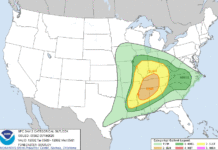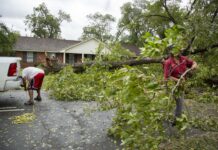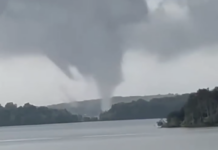
Georgia’s state climatologist Bill Murphey knows firsthand what it’s like to live through extreme weather. When an E4 tornado swept through Newnan in March — the most powerful tornado to hit the state in over a decade — his house was directly in the line of fire.
“I had significant roof damage, and to all my windows,” he said. “I’m in a real old house and that kind of helped me. But I’ve got humongous large windows. Every one of my windows were blown out from the pressure drop when the tornado went over.”
The devastating tornadoes that shook the Midwest last weekend have turned a new eye to extreme weather in America — and here in Georgia. One question is what the future could hold as the climate shifts.
Murphey said, despite the shock of the massive damage that last weekend brought, tornadoes are in December are not a freak phenomenon.
“It’s not necessarily uncommon, though, to get tornadoes in December, you know, early winter,” he said. “There are two peaks in the Southeast, this one in spring, there’s another one in early winter. And so, time-wise, that really is not that surprising.”
He said that he believed Georgia stood prepared to handle storms going into 2022.
“As far as my area and the warning we got, I felt like it was very quick and good,” he said.
But that doesn’t mean the future is certain. Pam Knox, an agricultural climatologist at the University of Georgia, said last weekend’s tornadoes are part of a larger, long-term question about the impact of rising temperatures here in Georgia.
“The jury’s out on whether or not climate change is going to make these storms more active or less active over time,” she said. “What we do know is that with warmer temperatures more of the year, the seasons for severe weather are likely to increase.”
Murphey echoed similar thoughts.
“Man-made impacts, global warming, climate change — that’s feeding into it as well, as far as giving us a lot of elevated relative humidity periods and high dew point days around these severe weather outbreaks in a lot of different parts of the country,” he said.
Georgia ranked fifth in the nation for tornadoes in 2021 with a total of 43 storms.







